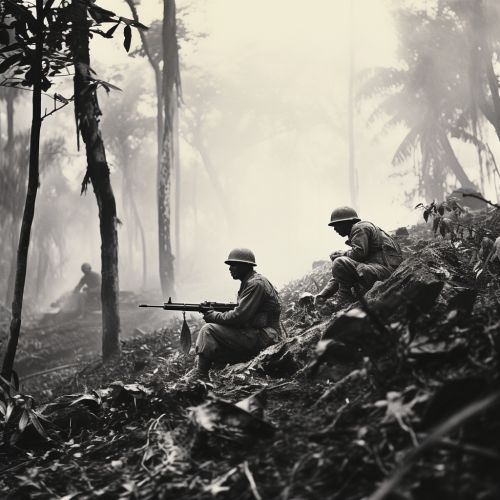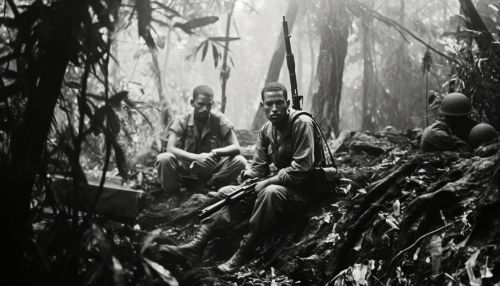First Indochina War
Background
The First Indochina War (1946–1954), also known as the Indochina War, was a series of conflicts in the Asian region of Indochina, involving the French colonial empire, the nationalist and communist forces led by the Viet Minh, and a number of other factions. The war is considered a part of the larger Cold War, and it led to the decolonization of the region, the establishment of North and South Vietnam, and the beginning of the Vietnam War.
Causes
The roots of the First Indochina War can be traced back to the end of World War II, when the Japanese occupation of Indochina ended and the French sought to regain control of their colonial territories. The Viet Minh, a nationalist and communist organization led by Ho Chi Minh, opposed the return of French rule and declared independence for Vietnam. This led to a conflict between the French and the Viet Minh, which eventually escalated into a full-scale war.


Course of the War
The war began with a series of Viet Minh attacks on French positions in northern Vietnam in late 1946. The French responded with a large-scale military operation, but the Viet Minh were able to avoid direct confrontation and wage a guerrilla war. Over the next several years, the war spread to other parts of Indochina, including Laos and Cambodia.
The French strategy relied heavily on fortified positions, known as the Hedgerow War strategy, which were intended to draw the Viet Minh into costly frontal assaults. However, the Viet Minh were able to effectively use their knowledge of the local terrain and their support among the rural population to maintain a sustained guerrilla campaign.
In 1950, the conflict took on a new dimension with the involvement of the United States and China. The US provided financial and military aid to the French, while China and the Soviet Union supported the Viet Minh. This internationalization of the conflict further escalated the violence and complicated the prospects for a peaceful resolution.
The war reached its climax at the Battle of Dien Bien Phu in 1954, where the Viet Minh scored a decisive victory over the French. This battle marked a turning point in the war and led to the negotiations that ended the conflict.
Aftermath
The First Indochina War ended with the signing of the Geneva Accords in 1954, which provided for the temporary division of Vietnam at the 17th parallel, with the Viet Minh controlling the north and the French and their allies in the south. The accords also provided for nationwide elections to be held in 1956 to determine the future of Vietnam, but these elections were never held.
The end of the First Indochina War marked the beginning of a new conflict, the Vietnam War, which would last until 1975 and have a profound impact on the region and the world.
Impact
The First Indochina War had a significant impact on the region and the world. It marked the end of French colonial rule in Indochina and the beginning of a period of intense conflict and instability in the region. The war also had a significant impact on the global balance of power, as it marked the beginning of the US involvement in Vietnam and the escalation of the Cold War.
